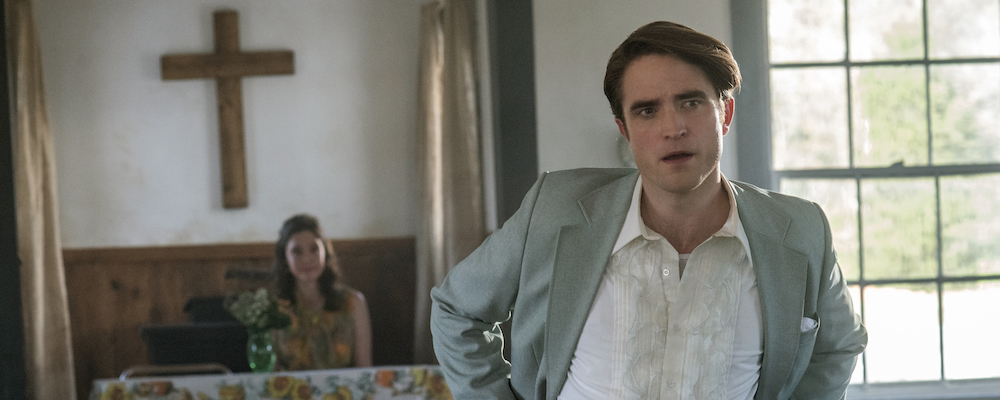‘The Devil All the Time’ Spans a Family Tree of Haunted Generations and Intense Vendettas
Alci Rengifo
“The Devil All the Time” is one of those enveloping sagas that spans generations. You almost have to draw out a family tree to chart its narrative where vendettas and resentments intertwine. It harkens back to a literary and cinematic American tradition of rural drama and sultry characters, where hot-blooded actions reveal much about the human condition. Director Antonio Campos builds the movie in layers, and part of the tension is watching how one person’s life bleeds into another’s life.
Campos and brother Paolo Campos adapted the movie’s screenplay from a novel by Donald Ray Pollock, who also narrates the film with literary flare. The story begins soon after World War II, as Willard Russell (Bill Skarsgård) returns as a veteran to his hometown of Knockemstiff, Ohio. It’s a rural community where religion, mostly of a Pentecostal variety, hangs heavy over every aspect of daily life. Willard harbors an intense belief in prayer, speaking to God from a particular, makeshift altar in the woods. He marries a local waitress, Charlotte (Haley Bennett) and has a son, Arvin (Michael Banks Repeta), who watches his father descend further into an Old Testament form of belief. When Charlotte dies from cancer, another tragedy strikes and Arvin is left in the care of his grandmother, Emma (Kristin Griffith) in nearby Coal Creek. Arvin (now played by Tom Holland), grows up next to Lenora (Eliza Scanlen), who was also left orphaned by tragic circumstances. Lenora grows up pious and devoted to the local church culture, eventually coming under the sway of an enigmatic young preacher, Preston Teagardin (Robert Pattinson). While Arvin and Lenora grapple with their family legacies and personal awakenings, a serial killer couple, Carl Henderson (Jason Clarke) and Sandy (Riley Keough), stalk the land.
This is a film about choices and their reverberations across the years. In the tradition of films like “A River Runs Through It” or more melodramatic works like “Legends of the Fall,” Campos manages to evoke how in small communities family histories cast very long shadows. It’s also about how we have no way of knowing how someone we meet today might return to our lives later. The Ohio towns evoked are vivid and confined, as if the woods block out the rest of the world. Only vaguely does the radio hint at the Vietnam War, what matters is the here and now in the community. Everyone’s personal lives form part of the history of their neighbors and friends. When Willard arrives from the war, Emma promises God to marry him off to a pious orphan named Helen (Mia Wasikowska), but Willard prefers Charlotte. Helen instead marries a traveling Pentecostal preacher, Roy Laferty (Harry Melling), who proves his closeness to the Lord by allowing spiders to crawl over his face, because such is his faith that they won’t bite. Then his fanaticism leads to a tragedy and thus his and Helen’s daughter, Lenora, ends up with Emma and Arvin later on. There’s nothing melodramatic here, this is how many family histories play out. The cop who talks to Alvin the night he becomes an orphan, Lee (Sebastian Stan), will later become the area’s corrupt sheriff. He has to reckon with the unsavory ways of his sister, Sandy, who picks up hitchhikers with Carl to practice a bloody form of erotic photography.
Campos, with the narration by Pollock, avoids turning this into an over-the-top soap. It’s a rugged drama about enduring the cards we are dealt, learning to survive in a traitorous world and dealing with loss. Situations that would resolve themselves cleanly in another movie have stark, unnerving resolutions here. The local culture is meticulously captured, especially the dominance of Pentecostal Christianity. We get true believers, including a doomed soul trying to carry out a literal resurrection on a dead person, and the more recognizable, sly figure Teagardin, played with oozing corruption by our new Batman, Pattinson. Teagardin preaches with false passion then promptly seduces some of the local girls. He’s shameless and knows how to manipulate the community’s powerful sense of belief. How faith can even endure the trials of reality is a subtle theme in this film. For Campos and Pollock, there are no miracles, but a terrain where the most clear-eyed survive. Tom Holland drops the “Spider-Man” costume for a role that reveals more than any other, his capacity for maturity and intensity.
“The Devil All the Time” is full of plot twists and suspense, but developed in a way where there is a human sense to it. Someone becomes pregnant and makes a sudden, split decision that ends terribly but will make Arvin also grab his gun and make a defining choice. Carl and Sandy, the killer couple, will be connected to everyone through how their choice of victims can put them in the path of the other characters. And always, the presence of faith is there. Carl even likes to search for new hitchhikers while playing gospel music in the car, and he quotes the Bible front and back. Religion is engrained on the people, but means little other than an excuse to impose patriarchal norms or fall into cultural habits, like going to church every Sunday even if during the week you’re a complete scoundrel.
Films like “The Devil All the Time” are gripping like when someone shares an old family story full of intrigue and revelations. We follow the characters through the course of their lives, and wonder how their decisions will play out, or if they will ever know how their lives are linked through pain and love. They say we are all connected, in this story that is more than true, whether through blood or revenge.
“The Devil All the Time” begins streaming Sept. 16 on Netflix.

